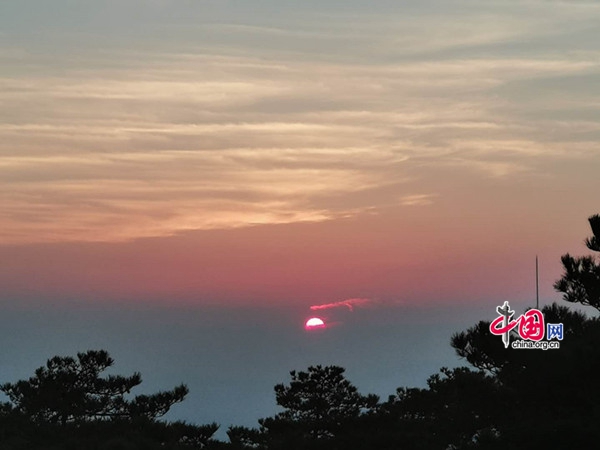A glimpse of China through soaring views and lakeside solitude
- By Wu Jin
 0 Comment(s)
0 Comment(s) Print
Print E-mail China.org.cn, April 24, 2019
E-mail China.org.cn, April 24, 2019

Visitors who start their trek from the back of Mt. Huangshan in early April are often captivated by majestic waterfalls and crystal streams running beneath the woods and lush forests. The weather on the mountain is capricious to say the least, it can drizzle in the morning, turn a clear sky-blue in the afternoon and become stormy a day after.
The stairs leading to the Guangming Peak, the best place to observe the sunrise, sunset and the famous "sea of clouds," takes about two to three hours on foot. Not far from the peak is a towering stone, a famous site shown in the famous 1980s TV adaptation of "The Dream of Red Mansions."
An alternative route is to take a 12-minute cable car ride near the Yungu ticket lot, which costs 80 yuan (US$11.9) per person. This leads to a completely different experience. The cable car first stops at the New White Goose (Xin Bai'e) Station, which is 1,650 meters high. Here, visitors can explore scenic spots at the northern and western areas like the Shixin Peak, the Auroral Pavilion and the famous Xihai Great Canyon. To continue their journey, visitors can take another cable car, which costs 100 yuan per person, to the front and central part of the mountain. Several miles away from the station is the Turtle Peak from where narrow stone steps lead to the Lotus Peak.
There are usually strong winds at the Lotus Peak during spring, and visitors who struggle to reach the top at 1,864 meters soon find their toil worthwhile.
Like a lotus blossom, the peak overlooks layers of precipitous mountain cliffs where pine trees, consisting of emerald needles and twisted trunks, root fiercely between the crevices of rocks. The ubiquitous pine, dubbed "The Greeting Pine" and the rocks, unique and strange, symbolize the independent and undaunted spirt that is greatly valued by generations of Chinese literati over the ages.
A trip from Mt. Huangshan to the West Lake in Hangzhou, the capital of Zhejiang province, takes about one and half hours by high-speed train. Exhausted from a long and mountainous journey, visitors are refreshed by the sight of peach flowers in full bloom at the causeways of the lake. Every year, spring is always the most beautiful season in Hangzhou where sprouting willow twigs and peach blossoms sway gently beside waters that ripple gently in breeze. The poetic scenery at the lake's two major causeways— the Bai and Su Causeways—usually draw large crowds of visitors.
However, there are still tranquil retreats not far from the crowded banks during the busiest season. The tomb of Lin Bu (or Mr. Hejing) is one of them. Nestled in front of the site of the Xiling Seal Art Society, northwest from the Bai Causeway, the oblivious tomb stands as a testament to the immaculate spirit of a man who lived a sequestered life. Presumably born in 967AD to a family of Confucian scholars, Lin, who is also known as China's Henry David Thoreau (the author of the Walden Lake), abandoned a career of officialdom. He went on to lead a reclusive life at the corner of the West Lake after traveling around the southeastern part of China during the North Song Dynasty (960-1127).
During his lifetime, he wrote numerous poems about his life as a hermit and more than 300 pieces of his works have been passed down the generations. His indifference to power and fortune was widely acclaimed by Chinese scholars who felt honored to befriend him.
Legend goes that people who visited Lin were always mesmerized at his unique way of receiving his guests. Visitors didn't have to know exactly where Lin lived, but could still metaphorically "knock on his door". Lin raised several cranes which worked as his messengers. They would be sent out in the morning, and would fly back to the courtyard whenever they spotted visitors. Lin would then row his boat there and take his guests to his home.
Calling the plum trees, his wives, and cranes, his children, Lin remained a bachelor throughout his life and died in 1028 AD, a celibate. Unfortunately, his tomb was destroyed after the collapse of the South Song Dynasty (1127-1279), but the looters got nothing valuable except an expensive inkstone and a jade hairpin. This, experts say, is evidence of his undying love for a woman whose identity still remains unknown.
We might get a glimpse of his personal feelings through one of his poems written from the perspective of a young woman who sent her loved one off. The poem mimics the style of "the Book of Songs", China's earliest poetry collection, reflecting age-old romance, thoughts and social realties. This poem entitled "Endlessly Thinking of You" is roughly translated as:
"The lush Mountain Wu and the lush Mountain Yue, stand at either side to see you off, but how can they fathom my sadness on your departure.
Sir, you're tearful and I'm tearful, and as the ribbon failed to tie the knot between us, I'm as passionless as a river whose tides have receded."






Go to Forum >>0 Comment(s)